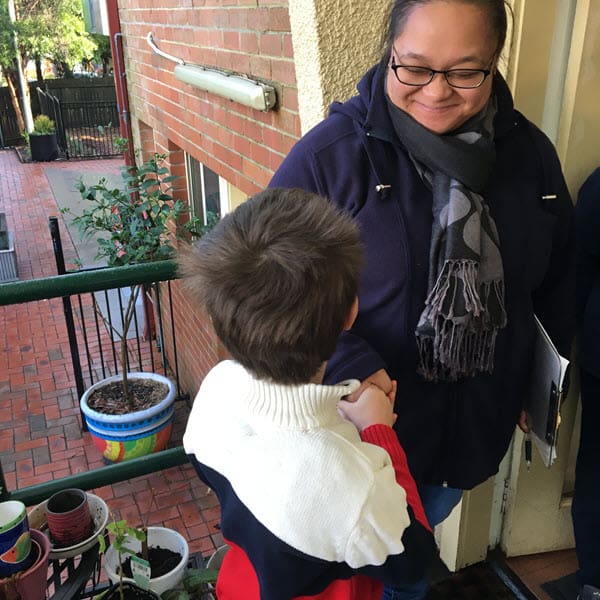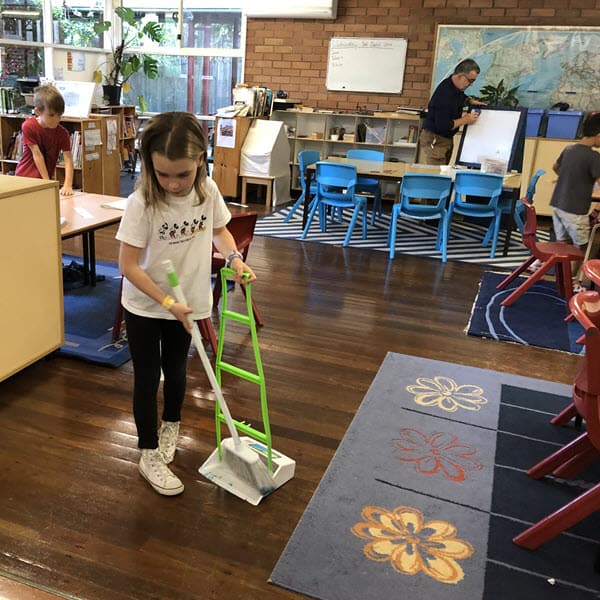Sometimes it can feel like our society has abandoned previous social norms. In some ways, this is a good thing, especially when social norms are not inclusive or are harmful. Many of these norms, however, are important in nurturing a society in which human beings treat each other with kindness and respect.
Somewhere along the way we forgot our manners.
This brings us to a critical element in Montessori education: grace and courtesy. It’s so important to us, we even name it, and our educators are trained specifically to address and teach grace and courtesy in their classrooms.
We certainly do not mean to say we live in a world full of rudeness (although it can feel that way at times!); there is plenty of good and plenty of people who do still care about grace and courtesy. What we are saying is that perhaps our society hasn’t emphasized it quite as much as we should have, and important parts of our humanity are sometimes being forgotten in the midst of regular discourse and relationships.

So, what can we do?
We can start by telling you where we focus our efforts. We can fill you in on how we teach the children in our care. When parents are able to recreate these efforts at home (as you likely already do), the effects tend to trickle outward into the community. In the short term, we are all modeling for those immediately surrounding us. In the longer term, we are working together to raise children who will go out into the world and do the same.
When our children are very young (infants and toddlers), the most important way we can teach grace and courtesy is through modeling. We can really show up for them. We can be present. We can be the people we hope they will grow to become. For many of us in today’s hurried world, this can mean slowing down a bit and noticing more.
Is your infant gazing at you? Gaze back. When they babble, echo their sounds or speak to them. When your toddler struggles to find the words to explain their emotions, sit, listen, and be there to supply them with the words they may not have. It’s also important to remember that our children do not just learn from their own interactions with us, but the interactions they see us having with others. Be mindful of how you speak with your partner, how you treat those in your neighborhood, how you interact with the barista at the coffee shop, and so on. Your child will be watching, and learning.
As our children grow a bit older, we might give them opportunities to practice grace and courtesy in their home and classroom environments. We can teach them how to greet others, how to resolve conflicts, and how to help someone who needs it. We must also teach them how to care for themselves and their environments. From learning to brush their own hair and wipe the crumbs from their face after a meal, to putting away their toys and helping with basic chores, there are so many different ways we can encourage children to learn and grow.

During the Lower and Upper Primary (6-12 Years), children reach a different stage in their development. They are more capable of abstract thought and begin to learn about and think about the larger world around them. They also have an internal drive toward fairness and justice, which makes them primed to learn about peace, kindness, empathy, and generosity. We can be rather frank with children when teaching them about many of the injustices in our world. They want to learn, and they will want to help.
Service projects are a great way for children to engage in this important work. Some projects may include:
- Baking and selling to raise money for charity
- Visiting a nursing home to read books, sing songs (we had this planned pre-COVID and it’s still on our agenda for future years)
- Cleaning up rubbish around the neighborhood
- Collecting food for and volunteering at a local outreach
- The Christmas partnership we started in 2019 with the Rotary Club of Frenchs Forest to provide gifts for Manly Warringah Women’s Resource Centre
Find a cause your child is passionate about and help guide them toward being part of the solution. It is important that children be involved throughout the process for the learning to be effective. They must help decide what cause they want to address, as well as help in developing the plan of action, and completing the action itself. You may notice their concerns during the course of conversations with them, or you may need to ask.
A quick summary of how parents can support grace and courtesy work at home:
- Allow your infants and toddlers to immerse themselves in the family environment and activities. Listen to them and give them your full attention when they need it. They may not have fully developed language, but they are full human beings, and we can show them the same honor and respect we do to people of older ages. This will not only allow them to feel their own value and worth, it will lay the groundwork for how they treat others throughout their lives.
- Teach your preschoolers how to take care of themselves and create structures that allow them to practice these skills. Even young children are capable of so much more than most adults give them credit for! Teach them how to meet their own hygiene needs, how to choose appropriate clothing, and how to listen to their bodies’ nutritional cues…and then give them the space to do this work.
- Preschoolers should also be given the information, tools, and time to help care for the home. Teach them basic chores and enlist in their help around the house. You may be surprised to find how much they enjoy this!
- Guide your child to care for others. When they are young, the work may be focused on manners and resolving conflicts peacefully. As they grow, this work will continue, but when they develop the capability to look outward, support their desire to contribute to their community. Children innately want to do good. They want to help others. One of the most important ways we can support them is to guide them toward becoming good community members.
- Guide your older children to support a cause. Many of our Upper Primary students are active supporters for climate change and animal rights.
Thank you – for taking the time to read this article, for being a part of our community, and for allowing us to join you on your parenting journey. Together, with our children, we can work to create a more peaceful, empathetic, kind and respectful world.



